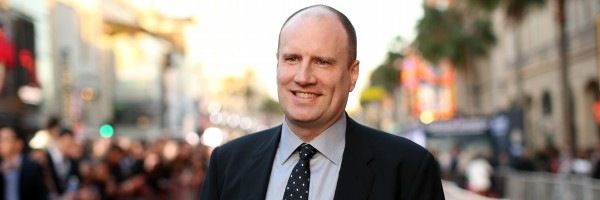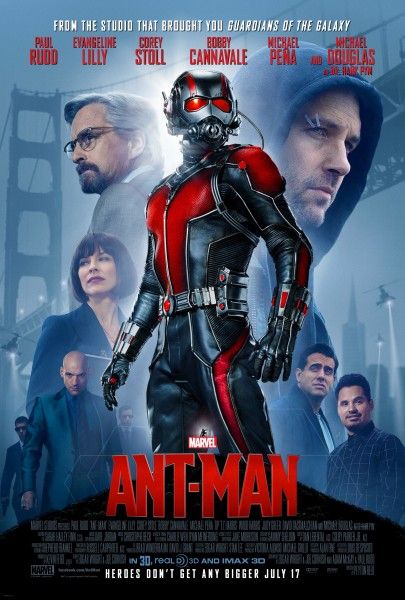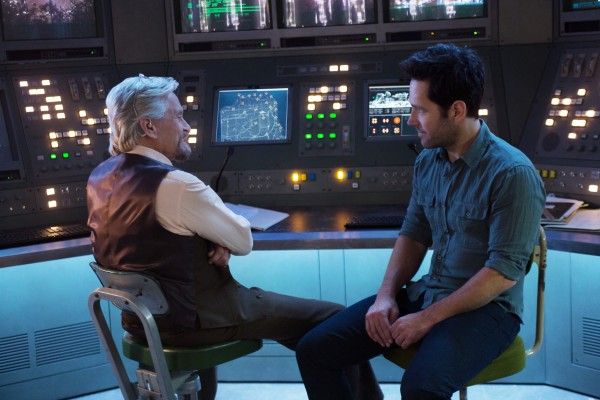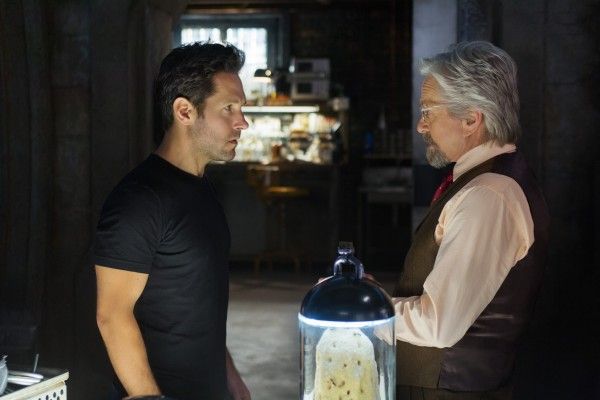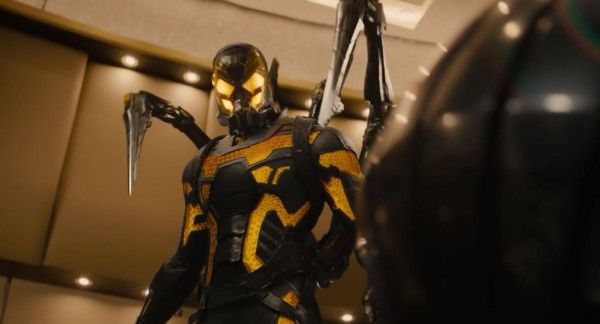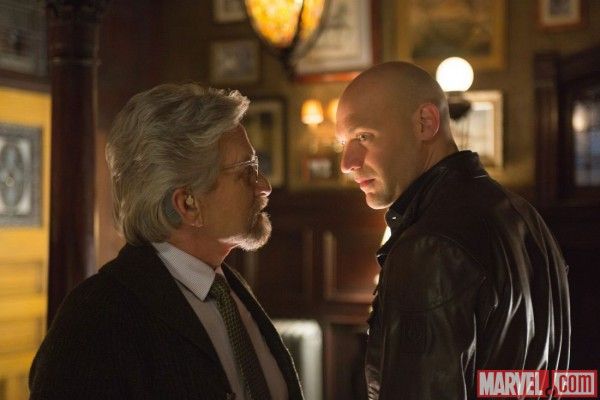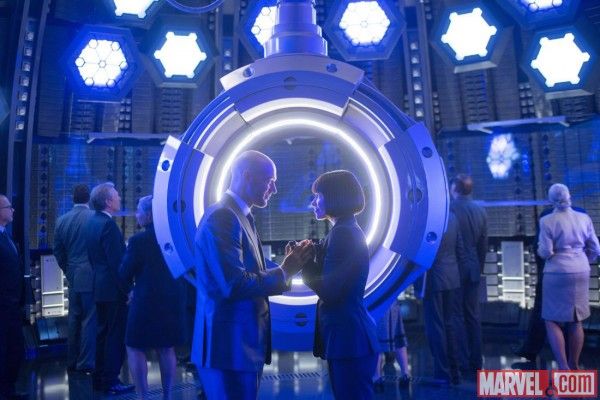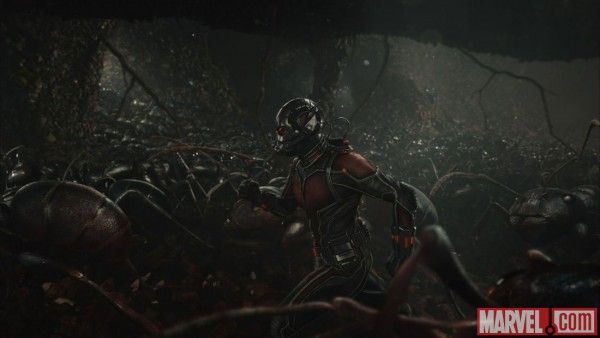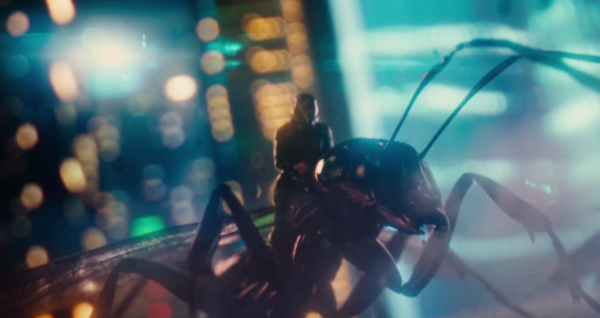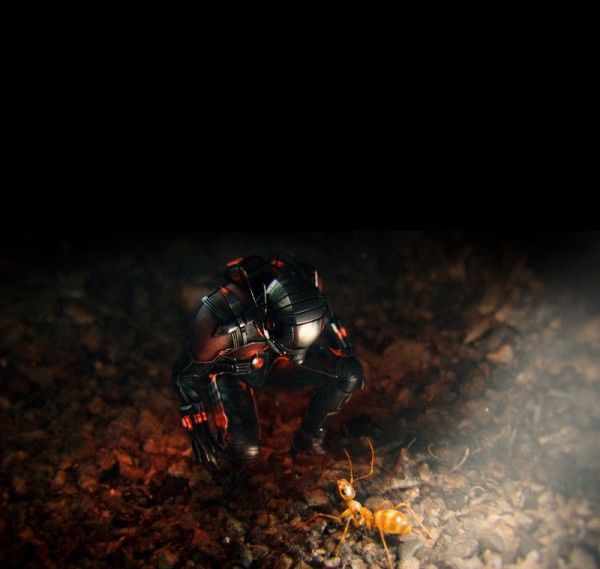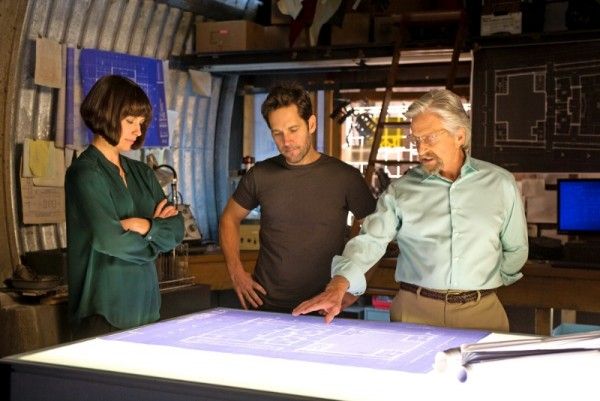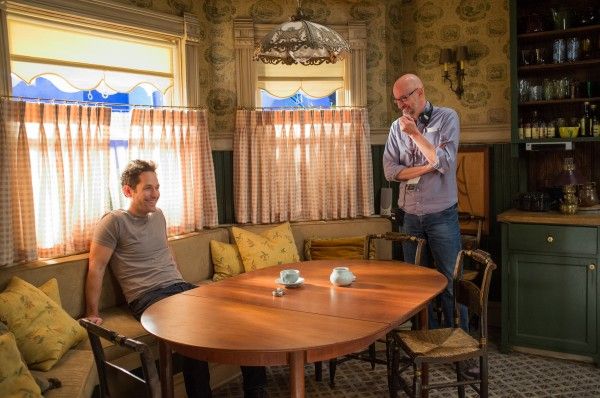After watching so many Marvel movies over the year, it was very cool to finally have the chance to speak to the man behind the MCU, Kevin Feige. The Marvel Studios President has been the visionary behind one of cinema’s greatest undertakings, and I was glad to pick his brain when other movie journalists and I got to visit the set of Ant-Man last year.
During our conversation with Feige, he covered a lot of ground including where the film fits into the MCU, its tone, how the script changed after Edgar Wright left the project, developing the characters, relation to The Avengers, all the work that went into the ants, and much more. Check out the full interview below.
What does this movie mean for Marvel, especially at the beginning?
KEVIN FEIGE: Well it’s about continuing to expand the cinematic mythology, and continuing to bring new characters, not just sequels. I think that’s what was great this year about Guardians [of the Galaxy]. That’s what excites us about this. Even though they all are within the continuity of the MCU, and then the year after this, Doctor Strange, continuing to explore avenues that people have seen before and also remind people that this is a big universe. There’s other stuff going on. And this very much has its roots grounded in the mythology of the cinematic universe and it’s connected via Hank Pym, to a period of time that relates to Howard Stark, it relates to Peggy Carter, and to the early days – well, not even the early days - but sort of the mid-days of S.H.I.E.L.D. sort of in the late ‘80s, early ‘90s, which was a period we haven’t seen of S.H.I.E.L.D.. We’ve seen kind of glimpses of it in news articles and things throughout the other films.
But this movie takes place in the present day for 96% of it and that was quite important to us. And he’s an Avenger. And he and Wasp are on the cover of that first Avengers. We have - I don’t know if they’re around here, but in the offices of Disney we’ve got big blow-ups of Avengers No. 1. And I just love, you know, picking off the fact that each of those characters are finally coming to life, and two more will be hit in this movie.
When does this film take place chronologically compared to the other movies? Is this right after Avengers: Age of Ultron?
FEIGE: We don’t exactly say. There’s an indication that it’s probably just after Ultron, just after Avengers 2. They all more or less take place within the chronology of the release of the movies. The exact months and the exact weeks are sometimes determined later.
What is it about Ant-Man that makes it right for release now versus something like Doctor Strange and did it have to do with having a script ready?
FEIGE: Well I think it’s...a lot of it was timing. A lot of it was when the drafts were coming together. A lot of it is when we sort of solidified a plan to bring it to the screen. And also because we were getting into - after this year with Winter Soldier and Guardians – the new story on existing characters, and bringing in new characters, and falling into it. Which is what we did this year. Which is what we’re gonna do next year and the year after. So it did sort of feel like the right rhythm to bring this guy to the screen. And...yeah, it was essentially ready to go.
Ant-Man is a weird character because Hank Pym pre-dates the Marvel superhero universe. He was introduced before there were even superheroes. And then Ant-Man himself has always been one of the supporting characters - Never really been able to maintain his own title. Why have Ant-Man as a solo movie at this point and not just sort of introduce him as you did with Hawkeye or Black Widow in a team scenario? Why does Ant-Man deserve his own movie?
FEIGE: Well I think a lot of it is based on sort of when... just what story we wanna tell. [Black] Widow fit into that version in Iron Man 2 and moving into Avengers 1. Hawkeye, I guess a little bit in Thor, but meeting him in Avengers 1. Because in Avengers 1 we wanted to meet a more populated universe of S.H.I.E.L.D. folks. Fury had just been this guy in the shadows, and we wanted to see his organization more populated and it made sense.
In this one it goes back to the first pitch we got from Edgar [Wright] and Joe [Cornish] in two thousand whatever it was, which as this history of him, independent of The Avengers, independent of a lot of his comic back story, and having a mentor and a mentee relationship. And it was unique then. It was a cool idea. It’s even more unique now because we’ve made ten movies. And none of them feature that kind of a relationship. None of them have the passing of the mantle, which is much of what this movie is about.
And now, ten movies in, there is the history from what we saw in the Captain America films, what we saw of Tony Stark’s father, his past in some of the Iron Man films. So, Hank can fit into that in an even more sort of logical way. And I think it’s unique action that we haven’t seen before in this kind of movie. And again, ten movies in, this will be eleven movies in. Having the opportunity to go to a place that we haven’t done before and do a type of action and a type of specs we haven’t done before.
It isn’t just about getting bigger, but it’s about getting clever and getting more unique. This movie gives that opportunity.
Cap 2 obviously has a spy thriller type feel, Thor was a little Shakespearean and Guardians is a new space opera of sorts - Going through this process so far with Peyton Reed and Paul Rudd, do we have a strong comedic tone with this?
FEIGE: Well, you’ve heard us say before, the genre that this is being incorporated with is a heist. [laughs] I was just gonna say, you saw Corey [Stoll’s] line. I heard you guys were here, I was like, “that’s the first line that...” [laughs] So, the fun - and when you guys walk around and see some things today - the fun of playing into the tropes of a heist film is cool.
In the same way that playing into ‘70s thrillers was fun in The Winter Soldier. So that very much is sort of the backbone of what’s making this tonally unique. And again, I wouldn’t say it’s more comedy than our other films. You know, the first picture we released of Paul, and I think some of what you’ll see today from Paul, is a much more serious version. That’s why he was interested in doing the movie. That’s why we were interested in showcasing him in a different way. And that’s why Peyton is interested in this movie because he’s always wanted to do a big superhero movie, and came close a few times.
So it’s not like, “oh, it’s the comedy guys. Let’s bring ‘em in.” But certainly there will be humorous elements as there are in all of our films.
You talked about how this story is about the passing of the. How different is it to provide an origin story for a superhero where there’s already all this built-in mythology inside the universe for him as opposed to someone like Iron Man or Captain America where it’s really starting that mythology from point A?
FEIGE: Well it’s been fun because...I mean there’s a lot of back story to get across in this movie and what Hank did in his past. And we see some of it. We hear about a lot of it but it’s not about the trial and error of inventing the Pym Particle. The Pym Particle is invented. He has been on adventures as Ant-Man, as we’ll see in this movie beforehand. This is more about – frankly, we can focus more on the character stuff instead of the science stuff. To focus on this criminal. This smart guy. This good guy, Scott Lang, who’s fallen into a life of crime because he’s good at it and because it comes easy to him. And to see that journey and hopefully root for him to get his act together, to get back together with his daughters. He’s the first Marvel hero to have a family, to have a kid, which is also unique and also fun. But I think it’s fun to liberate us from the trial and error of creating a technology and more focus on the trial and error of a character’s willingness to take on the mantle or ability to take on the mantle.
It’s interesting because one of the things that really stood out in the Comic-Con footage was in Douglas’ dialogue. He seems to have a real disdain for the idea of superheroes in general...
FEIGE: Totally.
...which I assume is earned from what we see of him in the past.
FEIGE: Yes. Yeah, he does not have a great experience with the people that he thinks are sort of running things today. And Howard [Stark] in particular, he had a not great encounter with in the past and that’s why he hung it up. That’s why he put it in a secured vault for decades and decades. And it’s not until this movie that he has a reason to take it out again. And he needs to use it, not because he wants there to be another superhero named Ant-Man, but because he needs to pull off the heist. He needs to stop his villainous ex protégé from perpetuating this technology in nefarious ways.
Will we get to see the older suit in the film, from more the original comics?
FEIGE: This is the older suit. He’s using the older suit.
Oh, he’s using the older suit?
FEIGE: This is the older suit.
The other one sort of has like the piping around and like the more open eye-holes.
FEIGE: It’s the same one, the costume that he uses in this movie is Hank’s old costume…This is sort of our interpretation of that.
Right.
FEIGE: There’s some suits you’ll see in the past.
And the Yellowjacket suit is the next generation of that?
FEIGE: The Yellowjacket is what Darren Cross has built himself, yes, to utilize his version of the technology.
From the scene we saw, it looks like he’s just a guy standing in clothes and he’s then all of a sudden just the Yellowjacket suit. How does that transformation work?
FEIGE: Well, the notion here is he puts it on while we’re outside the helicopter. While Ant-Man’s hangin’ outside the helicopter. So it’s sort of a quick change.
Within the MCU, how much is the world aware of Ant-Man? Do they know about Hank Pym and what he was doing back in the day?
FEIGE: No. I think the notion is, sort of during the Cold War and just in the final days of the Cold War he was... Well from the ‘60s to the end of the Cold War he was operating as a secret agent for S.H.I.E.L.D.
Okay.
FEIGE: So the world does not know much about him yet.
Do Avengers exist? Like is the word Avengers, is that what they were calling what he was doing? Is that...the label?
FEIGE: No. No. It was just S.H.I.E.L.D. It was very specific technology to S.H.I.E.L.D.. We reference Avengers in this movie with disdain that Hank has for them.
Douglas talked about how for him, one of the appeals in taking this was the idea that he’d never done green screen. He’d never done this kind of film. And it seems like you guys at this point have built enough of a reputation for how the cast get to play in things, that you can go to a Douglas now and offer him this brand new experience. Has he taken to it? Has it been something that he’s really been able to acclimate to and enjoy?
FEIGE: Yeah, he’s done some green screen still. As to the point.
BRAD WINDERBAUM: The bulk of his seedy stuff is coming.
FEIGE: Is coming, yeah. He’s amazing in this movie. You’ll see him tomorrow. He’s crushing it. And it’s really... I don’t think people have seen him like this in a long time. He’s playing older. He is older. He’s playing even a little older than he actually is, but still powerful, and you watch him and you feel like, I haven’t seen this guy in a long time. Liberace is awesome, and he deserves every award, but he’s a totally different... What was amazing about that is he wasn’t Michael Douglas at all.
He’s very much the cool... We wanted to cast somebody who you would realistically believe could have... If we made an Ant-Man movie in the ‘70s or ‘80s, he could have played him. And some of the things we run into now, since he’s so cool and so strong is, making sure it’s clear why he’s not just putting it on now and doing it himself. [laughs] We’re constantly sort of running into needing to clarify why that is, but I think he has taken to it. He’s got a lot of exposition to let Scott Lang know what had happened in the past and there was some trepidation, I think, about that early on. But we shot most of those scenes already.
And although he occasionally gives Brad [Winderbaum] a hard time... Anything else you wanted me to say, Brad? [laughs] Anything else you want me to clarify, Brad? Yeah. he killed it. I mean he really did an amazing job, and you believe it. You believe every word he’s saying. so he’s taken to it. And it is flattering and it is a responsibility that I think we take very seriously with any actor that joins up.
Corey Stoll, I don’t know if you’ll see it today, but the last couple weeks he’s been wearing his mo-cap pajamas, which nobody feels comfortable in, and everybody feels- feels awkward in, but again, we know that they can do that and can put aside those concerns because they trust us that it’s gonna look cool. At the end of the day we have ten movies to try to prove it, but we still don’t take it for granted. We still then go, we’ll spend the next nine months making sure that he looks awesome.
Speaking of Hank Pym, his most famous story in the comics is he beats his wife, he has multiple personality disorder and he kind of goes crazy. He becomes a villain. Obviously that’s not gonna be where you go with the movie but is there that darkness in Hank in any way?
FEIGE: Sure. Sure. I mean in the same ways that there are hints that Tony drinks too much, without doing the full-on “demon in a bottle” storyline. We hinted at a temper in a way that people who know the stories might go, “oh, perhaps that’s a bit of his character,” but not in a way that would ever indicate that, you know. He has lost his wife in this and his wife, in many ways, caused him to separate from S.H.I.E.L.D. and cause him to become a bit of a recluse now.
But we do see a bit of that. We see a bit of that temper, we hear a bit about it, and there’s a great line when he’s having a confrontation with Corey Stoll, who used to be his protégé, who he took under his wing and became almost like a son to him in certain ways. And Corey Stoll, in a very cool, threatening way that leads into the finale says, you know, “why...?” He feels abandoned by him. “Why did you abandon me?” Essentially.
And [Pym] goes, “I took you in because I saw so much of myself in you.” And then [Stoll] goes, “well, why did you leave me then?” And he goes, “I think I saw too much.” And I love that line because people like you guys who know what he’s done and what dark past he’s had. Again, he is not a wife-beater in this movie and I doubt [laughs] will ever be, for God sakes.
Does he wear a wife-beater? [laughs]
FEIGE: [laughs] Yeah, he could pull it off. He could pull it off.
You mentioned earlier about Wasp being in the movie. How much is Wasp the superhero?
FEIGE: Please don’t make a headline - Michael Douglas will now be a wife beater in Ant-Man! [laughs]
Wasp as a superhero in this movie. How much does that factor in it?
FEIGE: It factors in, in a number of spoiler-ish ways, but we will see Janet Van Dyne in action in this film. And part of sort of what happened to her. And then we will understand why that is the reason that he doesn’t want his daughter to follow in those footsteps. One of the reasons why he’s always so upset about superheroes in general, dismissive of them in general and also a reason why he doesn’t want her to put on the suit.
Because another very logical question in the movie is, why are you hiring this ex-con to put on your suit and do this? The answer is, because he has abilities in cracking security networks and in pulling off heists that nobody else has. Which is really why he needs to do it. But Hope is infinitely more capable of actually being a superhero in the beginning of this film, and we learn sort of that that’s ultimately when Hank reveals for the first time for the audience, and even the first time to Hope, what actually happened in the past and why he’s so nervous about putting on that suit. But there are things that we see towards the end of the film that indicate she could, she could get one of her own.
Can you tell us who’s playing the younger version of Hank and Janet?
FEIGE: Michael Douglas is playing the younger version of Hank, and we only see Janet when she’s in the helmet. She’s in the outfit. So you just sort of see eyes.
You mentioned the family element with the Scott Lang character. Can you talk a little bit about how that plays into it and how much focus that’s gonna be?
FEIGE: Well it’s quite a bit of the focus and it is almost the entirety of the motivation for Scott Lang to do this. We meet Scott Lang as he’s getting released from prison for the first time. We figure he’s been in for four or five years. His daughter is six. So he doesn’t have much of a relationship with her, and he very much wants a relationship with her. But he can’t hold down a job and he can’t pay child support, and his wife has married a police officer, which just, you know, makes it all worse for him.
And that’s the Bobby Cannavale character. Judy Greer is playing his ex-wife. And he begrudgingly, and is very upset about it, returns to a life of crime to try to get enough money to pay his child support, to be able to see his daughter. And ultimately that’s what Hank sort of plays off of to try to pull him into his scheme. So, we have a number of what I think are very sweet scenes between Scott and his daughter.
It’s also fun because the finale of this film, after the helicopter sequence that you see here ends. Our movies end with gigantic spectacle and Helicarriers falling out of the sky and...Avengers 2 is... [LAUGHTER] and even Guardians has a big sort of upper atmosphere space battle at the end. And I think people want to see that. I want to see that when I go to see a movie, an action movie, a summer movie, but we wanted to do it in a different way. And the finale, the entire finale of this film takes place in a little girl’s bedroom, in a way that is, I hope, gonna be very unique. And you’ll see little hints of it today as you walk around where everything you’ve seen up to this point in the movie with how, what the Yellowjacket can do, what the Ant-Man suit can do, what the Pym particles can do both to shrink things and to enlarge things, comes to a culmination in this little girl’s room, in a way that I hope, I think, is gonna make it one of the most unique finales we’ve ever had.
Are we gonna see a lot of ants? Actual ants?
FEIGE: Yes.
Make a lot of ant jokes.
FEIGE: You are gonna see more ants than you probably wanna see [laughs] and in the beginning of the movie it’s not dissimilar to the way I would talk about Rocket and Groot. There were some people that inherently just understood. A talking raccoon with a machine gun is cool. Right? Some people just inherently get that. A lot of people do not. And a lot of people went, so what? It’s a raccoon? It’s a tree? And I would go “yes, and you sort of laugh at the tree at the beginning, but by the end you really are gonna feel for the tree.” And they went “okay.”
In the same way, the ants at the beginning of the film, you see from a normal person’s point of view and there’s a couple of lines, just that are dismissed about there being an ant problem in Hank’s house, or seeing some ants in a kitchen of this one-bedroom apartment where Scott Lang lives. And they should be gross sort of ants that you don’t want in your kitchen. We reveal later that those ants are working for Hank. Hank’s controlling those ants.
And they have little cameras built onto them that he’s watching and surveying things with. By the end of the movie, and by the middle of the movie into the end of the movie a lot of the ants have personalities. And a lot of the ants become characters, not in a Pixar way, but hopefully in a photo-real, but slightly elevated kind of a way. So there’s a flying ant that Scott befriends and scares the hell out of him in a certain scene. And by the end, as a matter of fact, the way he gets towards that helicopter is by sort of heroically riding him.
There are so many different kinds of ant species, and we’re gonna see a good half dozen or dozen of them in this film, and I hope in a way that you’re sort of cheering for them and upset if one, two or three get blown away by the bad guy. So, a lot of the animation that is being worked on now is riding that fine line between - get that off of me creepy ants, and sort of a heroic noble steed, which is, that kind of a flying ant that [Scott Lang] rides.
And again, it’s the fun of the perspective shifts. When you see an ant down here or a whole line of ‘em, it can get creepy. Also, Hank can control the ants and he eventually teaches Scott how to control the ants in a way that they become even more organized and regimented than you’ve ever seen in real life. And that also helps to take away sort of the creepy vibe and add sort of this bit of wonder. There’s a sequence in the film where [Pym] is in his dining room in his Victorian-esque house in San Francisco and he’s just brought Scott there for the first time and is beginning to fill Scott in on what’s going on and what he wants Scott to do.
And he has offered Scott some tea and says, “oh, would you like a sugar?” He goes, “oh yes, please.” And a couple ants are carrying a sugar cube over towards...and he goes, “no-no, no thanks.” And the ant goes back. [laughs] And the entire time there’s this beautifully designed black on blue pattern of the wallpaper. At a certain point Scott goes, “how do you make ‘em do that?” And [Pym] describes how ants work. And the communication within ants.
And this little earpiece he has. And he says basically “I can go anywhere, I can do anything, I can see anything.” And suddenly the pattern on the wallpaper moves and shifts, and you realize it’s all ants, tiny little ants.
What’s the name of the winged ant?
FEIGE: Who said he had a name?
He’s a character.
FEIGE: Well, over the course of the movie Scott begins to give him a nickname, which may or may not be Antony. [laughs] Just play it for humor.
Can you talk about the ants and the preparation that went into not only the technology in the film, but research on actual ants?
FEIGE: Well there’s a ton of documentaries about ants and their organization and what what they can really do which is mind-blowing stuff. There’s a creepy movie called Phase 4, which some of you may or may not have seen which is sort of mind-blowing. And also good reference for macrophotography and what real ants can do. So there was a lot of research done on real ants so that we could incorporate them into it.
And some of it, a lot of it led directly into the film. There is a sequence where during the heist, Pym Industries, which you guys will see the very, very beginnings of tomorrow. Scott has to go through a water pipe to access another secured area of the facility. And in early designs, Hank had a World War II or Vietnam era, what do you call those ships? Just like a little troop ship that can hold, you know, say ten soldiers on it. And he had shrunk it down and that’s what they used. But oddly, when your human is that big, your boat is that big, you’re down at that angle and it’s a big river, you lose scale. So we have ants crawling above ‘cause there’s always huge numbers of ants in support of Scott for his missions. So you sort of have the ants but when we saw some research, there’s this amazing research with these fire ants. You may have seen. It sort of went around virally a few months ago. That or maybe that we just looked it up. But that ants operate as a liquid and a solid. Have you seen that stuff? Where clumps of ants can mold themselves and form themselves into...
Like ladders and stuff?
FEIGE: Well yes. If they can’t reach something, we do that too. So now in the movie it’s a raft built on these fire ants. And when he gets to the portion they connect each other and he can climb up it. And fire ants are very smooth and very red and look cool. We also realize that when you’re down that small, it’s the hairs that look really gross. [laughs] They make people go ewwwww, so and also the spindliness of the legs, so we’ve thickened the legs a little bit. We’ve brought down hair a little bit so that- so that when you’re looking up at a giant ant, it’s not completely horrifying.
Did you create a practical giant ant?
FEIGE: No. We haven’t. Without insulting films of the past, there are many examples of a manufactured giant something that somebody’s riding in front of a green screen and it just always looks like that. As cool as it would have been to have a giant ant thing to look at and ride, we’re not actually building one.
What about a set?
FEIGE: We are doing scale sets. Well...we’re not actually. What we’re doing is, there’s obviously a giant first unit that you’ll see in this movie. There’s a giant second unit on this movie. But, as a first for us, there’s a giant macrophotography set on this movie. And I think you guys will walk down there right after this, maybe. And it is sort of amazing what they’ve done. And those are full scale. There’s a craps table, there’s a bunch of server boards. There’s the inside of an ATM. All real, that we have these unbelievable macro lenses on, that we’re filming. There’s a bathtub that we’re filming.
All of the photography, some of which will just be reference as we move it into visual effects, some of which will end up being plates that we actually use for when Ant-Man’s that big. And it is pretty amazing. So when I walked down there the other day, they have a giant monitor and you’ll see this, and they were going across a terrain that looked like there was a helicopter going above some giant buildings and lit up things.
And I go, “okay, where is that?” Oh, it’s over here. And you move behind a curtain and it was about this big. With a giant motion control rig and a lens just going like that. There’s a lot of sort of unique processes that they’re using to gather all this stuff. There’s not an incredible shrinking woman giant telephone, or giant pencil or anything like that because we’ll put him into those actual environments.
When you’re casting a film like this, you’ve got sort of twin concerns. First you have the stand alone movie and the chemistry of people here. But then when you’re casting Scott or when you’re casting Doctor Strange for the next one, you also have to be thinking about how they’re eventually going to fit into your larger ensemble and your larger universe. Is the excitement, once you finish this, then figuring out when you get to use these people opposite characters we already know and love?
FEIGE: Yeah, I mean we know that pretty much already. But it is fun in casting to think, like for instance, we were casting Peter Quill. We wanted somebody that could carry Guardians, somebody that could surprise audiences and be that charming Star-Lord character. But also we’d always say, some day maybe he’ll have to go head-to-head with Downey.
So you have to cast fast…
FEIGE: Yeah, yeah, someday this guy is gonna have to do a scene. This guy, this girl will have to do scenes with with the other actors. I don’t know when that will be necessarily - yes I do... [laughs] But...BUT…even it just being a rallying cry for us saying, you know, there is a bar and all of the casting - if we can - needs to meet or exceed that.
Speaking of that, it seems like now that you’re introducing characters, newer characters that maybe the general public is less aware of, that these origin stories, these first films almost have an added weight to them in terms of importance. That they have to not only introduce them, but sell them because we’re probably always going to be seeing these people down the line. Tell me about how the vibe changed about how to do a first film?
FEIGE: Well, yeah, I think it’s what we’ve always tried to do, is just find a unique way in, and find a unique way to be true to what the character is from the comics and what fans are aware of and expecting. And at the same time do it in a way that mainstream audiences and as wide an audience as possible can find their own way into it. I guess with the more recent films, the pressure is a little less because nothing can beat the pressure of making and casting Thor, making and casting Loki, making and casting Captain America - knowing that Avengers was coming, no matter what. And starting production on Avengers 1 before those other films had been released, and before audiences had told us, “oh, we love those guys, can we see ‘em again?” Because if you didn’t love them, you’re gonna see ‘em again anyway. [laughs] which was cause for concern. But again, we just plowed ahead.
So the same way - yeah. If audiences don’t connect to any of these characters it’ll be a bummer, mainly just if the movie doesn’t work it would be a bummer, but we do expect to see these characters down the line again, so it’s that same sort of, “let’s do the best job we can of introducing the character.” And doing it in a way that audiences want to see him again.
You guys and Edgar Wright parted wars very late in the process. At that time was there a sense of like concern or panic? And then how did you decide that Peyton [Reed] was the guy to pick it up and take it all the way home?
FEIGE: Well the concern or panic was that we weren’t gonna make the movie we all wanted to make together. That was where the panic set in - That we were heading toward something that none of us would be pleased with. So in a way, when we decided to move away, it was a relief that we weren’t gonna make a big mistake together. And Peyton, as I’m sure you know, I worked with many, many years ago on a version of Fantastic Four at Fox that ended up not happening, and I liked him very, very much and it was my early days at Marvel.
And he’s one of the first filmmakers that I really spent a lot of time with. And spent a lot of time developing a script with, and developing a movie which ultimately didn’t happen with. But I always had very fond memories of that and a desire to work with him again once we became our own studio. And we came close a few times and he’s okay with me saying that he was, you know, it came down to he and James Gunn on Guardians. So when this opportunity arose, and he was available and he was intrigued.
And it wasn’t until we brought him in, talked about, you know, what we had done on the film, what we wanted to do on the film, and he saw his way into how he could add his voice to the film. And many of what are my favorite moments in this movie did not exist eight months ago and came to the table with with Peyton and with McKay and with Rudd - who you should talk to a lot, ‘cause Rudd is... I won’t say an unsung hero ‘cause he’s gonna be the face of this movie, but also in terms of, it was he and McKay who were writing together.
And Paul is still doing a lot of writing on the movie and doing an unbelievable job. And again, some of my favorite ideas, and whole new sort of concepts which plug right into elements from the comics were not in until McKay and Peyton and Rudd brought them, brought them to us. One of which is a part of the finale that... Anybody remember the old ride “Adventures Thru Inner Space” at Disneyland?
Sure. Mm-hm.
FEIGE: We’re doing an homage to that which is super, super cool. So it became and it is now, halfway through. I don’t wanna jinx it, but it is going incredibly well. And yes, there were a chaotic two, three weeks, whatever that was, but we believed in the cast. We believed in the idea. We believed in much of the work that had been done before and thankfully Peyton came in and jumped in with both feet and with great confidence and has led us to this point. And I’m assuming, hoping, will lead us to the end.
Ant-Man opens July 17th. Click on the links below for more of our coverage:
- ANT-MAN Set Visit: 106 Things to Know about Marvel’s Big Tiny Superhero
- ANT-MAN Set Visit: Paul Rudd Talks Suiting Up, Rewrites, and More
- ANT-MAN Set Visit: Evangeline Lilly Talks Ambiguity, Script Changes, and More

